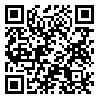BibTeX | RIS | EndNote | Medlars | ProCite | Reference Manager | RefWorks
Send citation to:
URL: http://payeshjournal.ir/article-1-597-en.html

 , Shamsedin Niknami
, Shamsedin Niknami 
 , Farkhondeh Amin Shokravi
, Farkhondeh Amin Shokravi 
 , Fazlollah Ahmadi
, Fazlollah Ahmadi 
 , Mohammad Reza Jafari
, Mohammad Reza Jafari 
 , Parvin Rahnama
, Parvin Rahnama 

Payesh
2009; 8: 349-359
Accepted for publication: 2 January 2008
[EPub a head of print-8 August 2009]
Objective(s): To plan an educational program to prevent HIV /AIDS among university students based on Health Belief Model (HBM).
Methods: This descriptive cross-sectional study was conducted in Tehran University in academic year of 2004-2005. The instrument used was a questionnaire including demographic information, knowledge questions, health belief model constructs (perceived severity, perceived susceptibility, perceived benefits and barriers) and attitude towards HIV /AIDS patients, high risk behaviors questionnaire and intention to take HIV test. The participants were selected through stratified and systematic methods. Data were analyzed performing Chi- square test, Pearson correlation and one way ANOVA.
Results: In all 664 students participanted in the study. The mean age was 18.47±8/1. According to self report, % 4.1 were smoker, %2.9 used substance drugs, % 1.5 suffered from sexual transmitted disease and %58.1 intended to take HIV test. TV, news paper and magazines were the main sources of information about HIV/AIDS. %26.4 believed that their knowledge is insufficient. %71.1 believed in having low risk of being infected. Almost all of the participants were highly aware of HIV /AIDS. The results also indicated that there was a significant relationship between the participants' knowledge and their perceived severity and susceptibility and benefits in term of willing to take the test. Lack of HIV voluntary counseling and testing center and fear of the test results were the main barriers of HIV test.
Conclusion: The findings suggest that we need to educate and raise the people consciousness about the perceived benefits of HIV test, the way of giving the test results, and the contact details and services for voluntary counseling and testing centers.
Accepted: 2018/11/28 | Published: 2009/10/15
| Rights and Permissions | |
 |
This work is licensed under a Creative Commons Attribution-NonCommercial 4.0 International License. |



